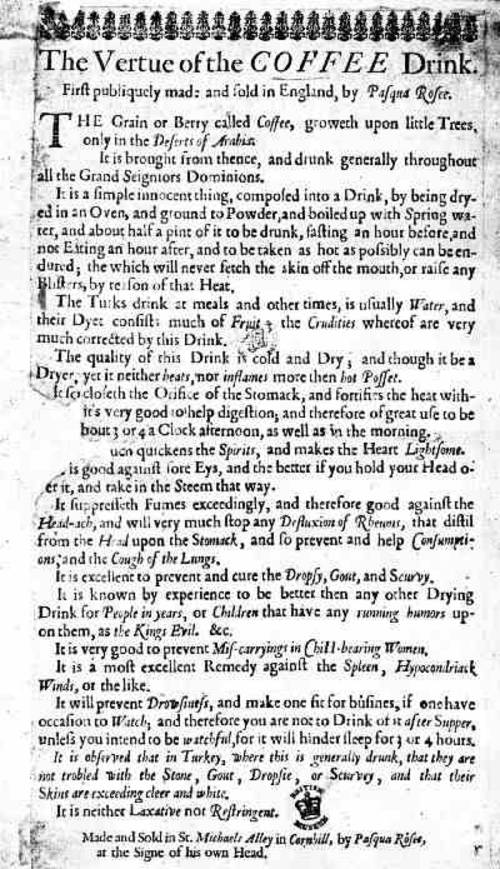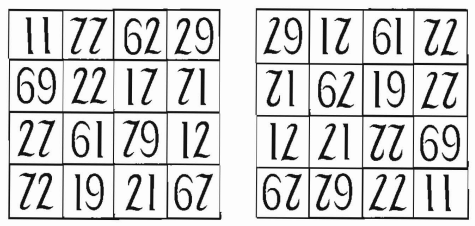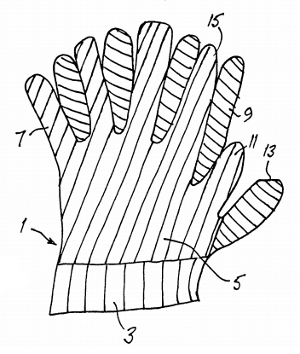In the 1650s an intriguing handbill appeared in London:

A merchant named Dan Edwards had brought the first coffee to England in 1652, and his Greek servant, Pasqua Rosee, opened the first coffee-house there. Evidently he saw some potential.
In the 1650s an intriguing handbill appeared in London:

A merchant named Dan Edwards had brought the first coffee to England in 1652, and his Greek servant, Pasqua Rosee, opened the first coffee-house there. Evidently he saw some potential.
In October 1956, Los Angeles mentalist Jack Swimmer declared that he would predict the exact number of votes that President Eisenhower would receive that year in the nation, in California, and in Los Angeles County. A small box containing his predictions was placed in a larger box, which was locked in a county safe on Oct. 10, and Swimmer deposited $5,000 with the county board of supervisors, saying they could give it to charity if he failed.
On Nov. 13, a week after Election Day, the supervisors opened the smaller box and found a tiny roll of paper on which were written three numbers:
33,974,241
2,875,637
1,218,462
These corresponded exactly to the published totals. The board returned Swimmer’s money, and he donated it to charity anyway, saying he was happy with his “small part in bringing out the vote.”
Swimmer wouldn’t say how he had accomplished the feat, though he said there was nothing supernatural about it. “Some of the spectators later said the tiny roll of paper on which the figures were written could have been hidden in a hollow key and injected into the box when it was unlocked,” noted a UPI account. “But by the time they thought of it, the key was no longer available for inspection.”

This reversible magic square comes from Henry Dudeney’s Canterbury Puzzles.
Each row, column, and diagonal in the square totals 179.
Thanks to some clever calligraphy, this remains true when the square is turned upside down.

The last great auk in the British Isles was killed because its keepers feared it might be a witch. In 1840 five men discovered it asleep on the Scottish island of Stac an Armin. From John Alexander Harvie-Brown’s Vertebrate Fauna of the Outer Hebrides (1888):
It was Malcolm M’Donald who actually laid hold of the bird, and held it by the neck with his two hands, till others came up and tied its legs. It used to make a great noise, like that made by a gannet, but much louder, when shutting its mouth. It opened its mouth when any one came near it. It nearly cut the rope with its bill. A storm arose, and that, together with the size of the bird and the noise it made, caused them to think it was a witch. It was killed on the third day after it was caught, and M’Kinnon declares they were beating it for an hour with two large stones before it was dead: he was the most frightened of all the men, and advised the killing of it.
They threw the body behind the hut and left it there.
When the last heath hen, “Booming Ben,” died in 1932 on Martha’s Vineyard, local newspaper editor Henry Beetle Hough wrote an obituary for the species: “There is a void in the April dawn, there is an expectancy unanswered … We are looking upon the utmost finality which can be written, glimpsing the darkness which will not know another ray of light. We are in touch with the reality of extinction.”
Notable cross-references in the index of Donald Tovey’s Essays in Musical Analysis, Volume VI, 1939:
Agnostic, see Dachsund.
Appendicitis, see Cadenza.
Critics, see Experts.
Experts, see Critics.
Giraffe, see Berlioz.
Hedgehog, see Brahms.
Monster, see Loch Ness.
Noodles, see Brahms on plagiarism.
Pope, see Bruckner.
Sneeze, see Cherubini and Beethoven.
Sugar, see Grocer.
Witchery, see Mendelssohn.
Evelyn Waugh owned a translation of Tolstoy’s novel Resurrection for which someone had composed “a particularly felicitous index. The first entry is: ‘Adultery, 13, 53, 68, 70’; the last is ‘Why do people punish? 358’. Between them occurs such items as: Cannibalism, Dogs, Good breeding, Justification of one’s position, Seduction, Smoking, Spies, and Vegetarianism.”
See Memorable Indexes, More Amusing Indexes, Reference Work, and “He Suddenly Dropt Dead of Heart-Disease.”

In December 1941, after eight months in the British Women’s Auxiliary Air Force, 19-year-old Nina Masel observed that “the main consequence of a lot of women living together seems to be that … conventional barriers and restraints are torn down and conversation gets down to bedrock.” The women all shared the same circumstances and had the same goal, so there was no point in pretending otherwise.
“And what is this thing we’re all after?” she asked. “Obviously, a man.” She estimated that 85 percent of the women’s conversation was about men, 15 percent about domestic and shop matters, and “a negligible proportion” about other things. So frank was the women’s talk that Masel was able to write out the rules of “The Great Man-Chase”:
1. Quality: The desirable qualities are rank, wings, looks, money, youth in that order. Rank is unbelievably important. There’s a Wing-Commander here whose only redeeming feature is that he’s young. He isn’t good-looking, he’s owned to be a great bore and he’s extremely ‘fast’ (which is not a recommendation) yet he could go out with any woman on the station he cared to ask. No one would refuse. … The height of sex-rank is commission and wings. Higher commission, the better. Sergeant pilots and ground commissions tie for second place. This includes army officers. Ground stripes come a poor third. For the rest as far as most Ops girls are concerned, there is little hunting-value. In the term ‘looks’ I include charm, personality, etc. This counts only as a narrow comparison viz P/O [Pilot Officer] A is better than P/O B because he is more charming, but we’d rather go out with P/O B who is not charming, than with Sergeant C who is (and he’s good-looking too). Members of the Army without commissions don’t get a look in at all …
2. Quantity: Naturally the more men one can fasten to one’s train the more prestige one gains in the Chase.
3. Intensity — a deliberately vague term embodying length of affair, extent of ardour and its manifestations.
The longer a woman could keep a man, the higher she ranked in the competition, particularly if he was passionately attached to her. “It seems to me that practically the entire object of the Chase is a matter of vanity and prestige,” Masel concluded. After participating in the Chase for a few months she had found:
a. “That I am happiest when I am conducting two or three successful affairs with eligibles as above.”
b. “That I am second happiest when I am pretending to other girls that they are successful affairs as above.”
“A girl in our Control had been trying very hard to get a date with a new officer,” she wrote. “She was sitting next to him in the Ops room one day full of concentration in her conversation when suddenly she smiled, looked across at me, and mouthed the words ‘Got him!'”
(From Angus Calder and Dorothy Sheridan, Speak for Yourself: A Mass-Observation Anthology, 1937-49, 1984.)
lubberwort
n. food that makes one idle and stupid, food of no nutritive value, junk food
Helen Fouché Gaines’ 1956 textbook Cryptanalysis: A Study of Ciphers and Their Solution concludes with a cipher that, she says, “nobody has ever been able to decrypt”:
VQBUP PVSPG GFPNU EDOKD XHEWT IYCLK XRZAP VUFSA WEMUX GPNIV QJMNJ JNIZY KBPNF RRHTB WWNUQ JAJGJ FHADQ LQMFL XRGGW UGWVZ GKFBC MPXKE KQCQQ LBODO QJVEL.
It was still unsolved in 1968, when Dmitri Borgmann, editor of the Journal of Recreational Linguistics, urged his readers to tackle the problem: “Are you going to let this challenge lie there, taunting you for the rest of your lives? Or are you going to get busy and solve that pesky little crypt?”
As far as I can tell, they let it lie there, and it remains unsolved to this day. Any ideas? There are few clues in Gaines’ book. The cipher is the last in a series of exercises at the end of a chapter titled “Investigating the Unknown Cipher,” and she gives no hint as to its source. Of the exercises, she writes, “there is none in which the system may not be learned through analysis, unless perhaps the final unnumbered cryptogram.” The solution says simply “Unsolved.”

This is romantic — in 1990 Terence King patented a pair of gloves connected at the palms, “so as to allow a courting couple palm contact inside the glove whilst their fingers and thumbs remain covered.”
“It may also be so sized as to accommodate and fit the respective hands of a mother and child.”